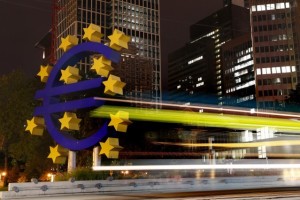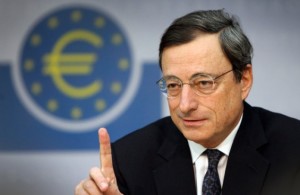Mario Draghi hits the bricks
Nicknamed Super Mario, the current President of the ECB hands over to Christine Lagarde after 8 years. He may have saved the Euro, but the European Union’s financial sector has woes ahead as its cash cow – Britain – prepares to cut itself loose from the burden

As yesterday drew to a close, so did the tenure of Mario Draghi as the President of the European Central Bank (ECB).
Mr Draghi, a man who holds the perhaps dubious accolade of having vowed to ‘do what it takes to save the Euro’ by defying the forces of monetary conservatism at the Bundesbank in Germany, bowed out yesterday evening after almost exactly eight years as President of the central bank.
Just four days before the absolute powerhouse of the entire region – Great Britain – leaves the European Union, unshackling itself from the burden of European socialism, financial ineptitude, slovenly business practice and old fashioned unproductive industry sectors, The European Central Bank’s pro-Euro, unionist leader moves on.

Mr Draghi assumed office in November 2011, with the ferocious debt crisis in Greece being in full swing and having also spread to other economically defunct, socialist siesta nations Spain and Italy. At that time yields on government stocks across Europe were soaring and the very future of the single currency – the European Union’s flagship project – looked in jeopardy.
As is often the case these days with many central bank officials, Mr Draghi came from the world of academia, having begun his career as a full professor at the Cesare Alfieri Faculty of Political Science of the University of Florence from 1981 until 1994. He was educated at the Massachusetts Institute of Technology (MIT), an Ivy League establishment that has turned out many world leaders.
Often academia and capitalism do not mix, and that is certainly the case in Europe, however other examples of such a background have proven successful – Stanley Fischer, a highly respected academic, has held very senior positions at the Federal Reserve Bank in the United States, and was head of the Bank of Israel for several years, doing a sterling job in both posts.
From a long term period in academia, Mr Draghi moved into banking.
From 1984 to 1990 he was the Italian Executive Director at the World Bank. In 1991, at the initiative of the then Minister Guido Carli, he became general director of the Italian Treasury, and held this office until 2001.
During his time at the Treasury, he chaired the committee that revised Italian corporate and financial legislation and drafted the law that governs Italian financial markets. He is also a former board member of several banks and corporations (Eni, Istituto per la Ricostruzione Industriale, Banca Nazionale del Lavoro and IMI).
Mr Draghi was then vice chairman and managing director of Goldman Sachs International and a member of the firm-wide management committee (2002–2005). He worked on the firm’s European strategy and development with major European corporations and governments.
After the revelation of off-market swaps used by Greece with the help of Goldman Sachs, he said he “knew nothing” about this deal and “had nothing to do with” it. He added that “the deals between the Greek government and Goldman Sachs had been undertaken before his joining”.
In December 2011, Draghi oversaw a €489 billion three-year loan program from the ECB to European banks.
The program was around the same size as the US Troubled Asset Relief Program in 2008, though still much smaller than the overall US response including the Federal Reserve’s asset purchases and other actions of that time.
Under Mr Draghi, the ECB promptly repealed the two foolish rate hikes made by his predecessor Mr Trichet, and stepped up the bond purchases from struggling euro-zone nations to help with the debt crisis, commentator Steve Goldstein wrote in mid-January, 2012.
At that time, “Draghi and all of his colleagues (the decision was unanimous) chose not to cut the price for private-sector loans below the 1% achieved with the “repeal”, even when he forecasts inflation to fall below the targeted 2% later this year.” As such, Steve Goldstein concluded, Mr Draghi would leave more moves to national leaders Sarkozy and German Chancellor Angela Merkel and central banks, contrasting Draghi’s actions with those of the Fed’s Ben Bernanke.

As with most leadership positions within large central banks these days, Mr Draghi’s tenure was not without criticism.
He is a member of the Group of Thirty founded by the Rockefeller Foundation. The Group of Thirty is a private group of lobbyists in the finance sector.[43][44] For this reason, he is accused of having a conflict of interest as president of the ECB. Some parties also see Draghi’s former work at Goldman Sachs as a conflict of interest.
Perhaps somewhat bizzarely, the Euro rose against the dollar yesterday as Mr Draghi delivered his final monetary policy decision, that being the decision by the ECN to leave the deposit facility rate unchanged at minus 0.50% and the marginal lending facility at 0.25%.
This was in line with what the market was expecting. Mr Draghi said that the central bank was ready to adjust its instruments where necessary to achieve its inflation mandate. He also said that the bank would resume quantitative easing as previously guided. Draghi leaves a conflicted legacy.
Rather ominously, Christine Lagarde, currently the Chairman of the IMF, will take over from Mario Draghi as President of the ECB.









